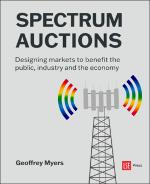Spectrum Auctions
Designing markets to benefit the public, industry and the economy
Abstract
Access to the radio spectrum is vital for modern digital communication. It is an essential component for smartphone capabilities, the Cloud, the Internet of Things, autonomous vehicles, and multiple other new technologies. Governments use spectrum auctions to decide which companies should use what parts of the radio spectrum. Successful auctions can fuel rapid innovation in products and services, unlock substantial economic benefits, build comparative advantage across all regions, and create billions of dollars of government revenues. Poor auction strategies can leave bandwidth unsold and delay innovation, sell national assets to firms too cheaply, or create uncompetitive markets with high mobile prices and patchy coverage that stifles economic growth. Corporate bidders regularly complain that auctions raise their costs, while government critics argue that insufficient revenues are raised. The cross-national record shows many examples of both highly successful auctions and miserable failures.
Drawing on experience from the UK and other countries, senior regulator Geoffrey Myers explains how to optimise the regulatory design of auctions, from initial planning to final implementation. Spectrum Auctions offers unrivalled expertise for regulators and economists engaged in practical auction design or company executives planning bidding strategies. For applied economists, teachers, and advanced students this book provides unrivalled insights in market design and public management. Providing clear analytical frameworks, case studies of auctions, and stage-by-stage advice, it is essential reading for anyone interested in designing public-interested and successful spectrum auctions.
Keywords
Regulation; Digital communication; Auction design; Radio spectrum; Auction theory; Spectrum auctionsDOI
10.31389/lsepress.spaISBN
9781911712022, 9781911712046, 9781911712053, 9781911712039Publisher
LSE PressPublisher website
https://press.lse.ac.uk/Publication date and place
London, 2023Classification
Economics
Public opinion and polls


 Download
Download Web Shop
Web Shop